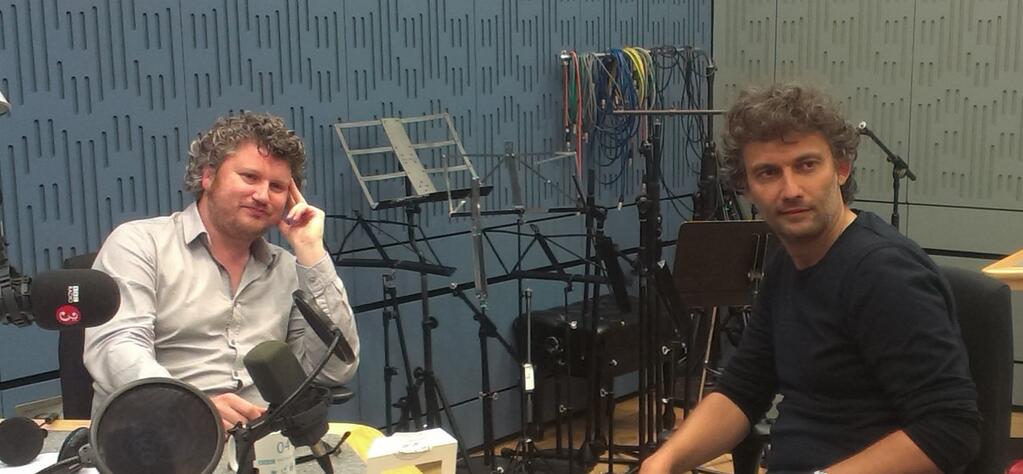|
|
|
|
|
|
|
|
|
BBC Radio 3,
Music Matters, 31.Mai 2014 |
|
Jonas Kaufmann Interview
|
 |
|
Presented by Tom Service. This edition of Music Matters is given to an extended interview with Jonas Kaufmann, acclaimed by the New York Times as "currently the most in-demand, versatile and exciting tenor in opera". Tom meets Kaufmann in London, as he starts rehearsals for Jonathan Kent's new staging of Puccini's Manon Lescaut at Covent Garden. |
|
|
|
Interview |
|
|
| Zusammenfassung auf der
Webseite des Royal Opera House: |
|
|
Listen: Jonas Kaufmann - 'There are two types of musicians. I always
belonged to those in the passionate group' |
|
|
The German tenor tells BBC Radio 3 his thoughts
on Regietheater and gives hints at future plans.
By Chris Shipman |
|
Jonas Kaufmann was the focus of a special
edition of BBC Radio 3's Music Matters, during a break in rehearsals of
Jonathan Kent's new production of Manon Lescaut.
Jonas spoke to Tom
Service about what drove him to pursue a career in music:
'There are
two types of musicians - the ones that are really passionate about
everything and only seek emotion, and those that seek perfection and
technique. I always belonged to those in the passionate group', said the
Munich-born tenor. 'My family loved music so I grew up listening to
classical music all the time, especially meaty and heavy classical music -
not just Mozart and Bach, but the real things: Mahler, Strauss, Wagner,
Bruckner, Shostakovich. Things with lots of power but not opera.'
'I
had some key moments when I saw an opera performance and I realized I could
be part of that. It's a step further being a musician in the middle of an
orchestra as opposed to being accompanied by the orchestra and being on the
set with a costume, make-up, and wig. It seemed like the ideal situation to
be in if you really want to say something.'
He spoke of the
challenges faced by singers, unlike those faced by other musicians:
'The problem with singing is it's such a different way of teaching something
- with an instrument you can show how to hold the violin and the bow. [With
singing] your teacher tells you, "When you inhale it's like you're smelling
a rose, and when you open your mouth it should be like you've put a pear in
it, or a hot potato". There are all these crazy little images that they give
you! We don't have a common language.'
'Through the experience that
I've had in the last five or six years, I can estimate how my voice is going
to change and what a part is going to be like,' said the tenor about how he
plans for roles within an art form that sees him booked for new parts many
years in advance. 'We get stuck with the things we planned five years ago.
You have to plan in a way that's healthy.'
'The moment you don't have
anyone waiting at stage door for you, it's probably terrible. I don't want
to think of that day. But sometimes you have the impression there are fans
that with the ticket, believe they've bought a part of me too. It's not just
a performance,' said Jonas of the pressures of being one of the world's top
opera singers. 'It's difficult to combine the two worlds [of personal and
private]. Nevertheless, it shows you the power of what we're all doing.'
The tenor saved special praise for the Covent Garden audience: 'Compared
to other venues, they're very good listeners. You can feel that they're
there. It's very intense.'
He also gave his thoughts about how opera
stays relevant and Regietheater (director's theatre):
'We are the
preservers and conservers of an art form that had its peak in the past.
Opera itself is not outdated - it still works and it still pushes the button
in the right spot if it's done in the right way. I'm not against renewing
operas, especially in terms of productions. The idea [of Regietheater] is
very good because you need do ensure [the art form] doesn't get stuck. Great
opera is based on instincts that have never changed - we still fall in love
with each other, we still hate each other, we still fear death. If you give
the piece the chance, even if it's 300 years old, it will still do the same
thing. '
Jonas also gave his thoughts on music written in the second
half of the twentieth century, his future plans, and the differences in how
singers connect with live audiences between opera and more intimate works
such as Lieder. |
|
|
|
|
|
|
|
|
|
|
|
|
|
|
|
|